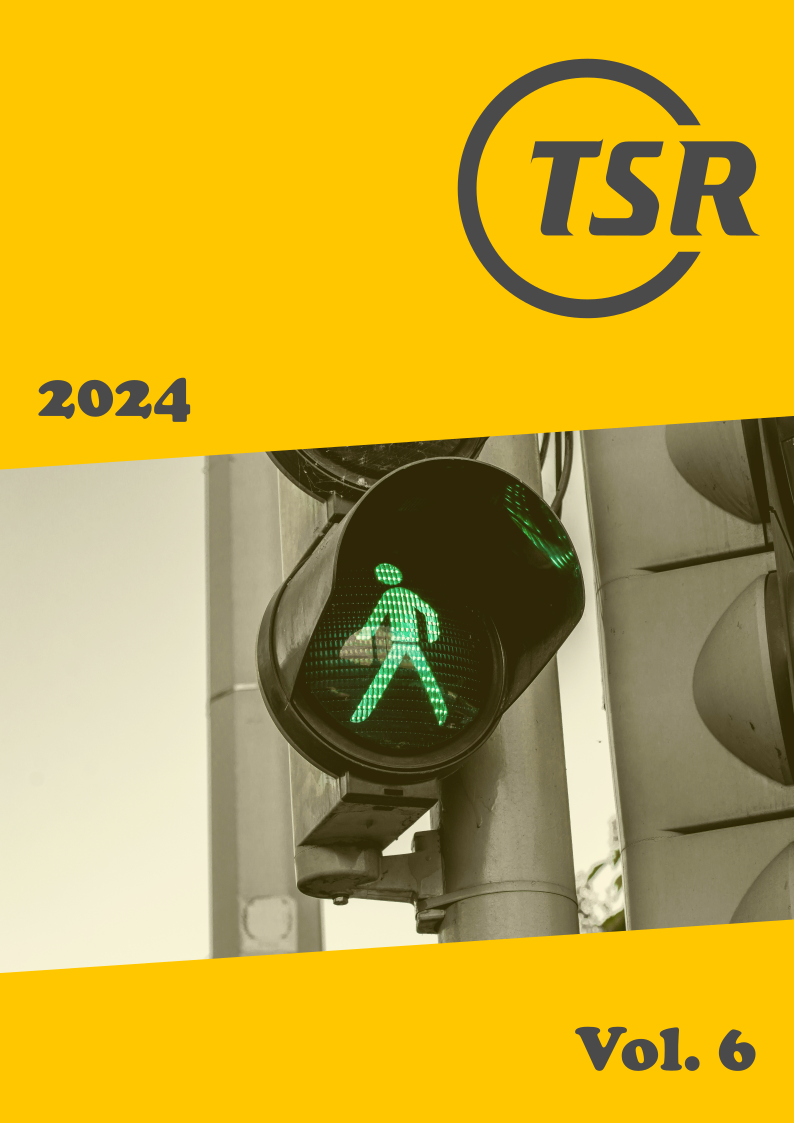Interventions to reduce the speed of cyclists in work zones—cyclists' evaluation in a controlled environment
DOI:
https://doi.org/10.55329/ohhx5659Keywords:
comfort, cyclists, road works, safety, speed reduction, work zoneAbstract
Current guidelines for work zones do not consider the needs of cyclists and pedestrians enough, which leads to unpredictable situations and a resulting higher crash risk for these road user groups. With respect to motor vehicles, speed management with various interventions is an important and well-studied measure. Their design can be hazardous for cyclists, but a systematic investigation of speed reducing interventions that are applicable to cyclists is lacking. In a controlled setting, four different types of interventions were studied regarding their effect on cyclist speed, attention, and comfort at the first encounter with the intervention and when familiar with the setup. Thirty cyclists with a variety of bicycles first rode a baseline condition to establish their desired speed, then they encountered the interventions eight times in a row. During the first encounter their speed dropped but went back to baseline levels during the following trials, regardless of intervention type. The glance behaviour showed that cyclists' attention was focused much more on the interventions themselves than beyond, which can be problematic in unpredictable environments like work zones. Comfort ratings varied widely, with interventions causing vibrations being rated as least comfortable. To conclude, speed-reducing interventions for cyclists must be applied with care and their effect weighted against potential risks of causing crashes and distraction.
Downloads
References
AASHTO, (2012), 'Guide for the development of bicycle facilities', AASHTO, GBF-4.
Attanayake, U., A. F. Mazumder, W. D. S. Sahi, M. Mueller, D. Black (2017), 'Enhancing non-motorized mobility with construction zones', Transportation Research Center for Livable Communities (TRCLC), TRCLC 16-02.
Berg Alvergren, V., I. C. M. Karlsson, P. Wallgren (2019), 'Specification of nudges', MeBeSafe, Deliverable D3.1. to the MeBeSafe proejct.
Bilton, P. (2012), 'Pedestrian risk management during urban construction projects', Australasian College of Road Safety Conference, Sydney, Australia, 9–10 August 2012.
Castro, G. P., F. Johansson, J. Olstam (2022), 'How to model the effect of gradient on bicycle traffic in microscopic traffic simulation', Transportation Research Record, 2676(11), 609–620. DOI: https://doi.org/10.1177/03611981221094300
Denton, G. G. (1980), 'The influence of visual pattern on perceived speed', Perception, 9(4), 393–402. DOI: https://doi.org/10.1068/p090393
Eriksson, J., Å. Forsman, A. Niska, S. Gustafsson, G. Sörensen (2019), 'An analysis of cyclists’ speed at combined pedestrian and cycle paths', Traffic Injury Prevention, 20(sup3), 56–61. DOI: https://doi.org/10.1080/15389588.2019.1658083
Eriksson, J., P. Henriksson, M. C. Rizzi (2022), 'Oskyddade trafikanters inblandning i olyckor och deras skadeutfall: En jämförande studie mellan fotgängare, cyklister, mopedister och motorcyklister [Vulnerable road users involvement in accidents and their injury outcome: A comparative study between pedestrians, cyclists, mopedists and motorcyclists', VTI, VTI rapport 1133.
Fajans, J., M. Curry (2001), 'Why bicyclists hate stop signs', ACCESS Magazine, 1(18), 28–31. DOI: https://doi.org/10.1111/1467-8748.00285
Gadsby, A., K. Watkins (2020), 'Instrumented bikes and their use in studies on transportation behaviour, safety, and maintenance', Transport Reviews, 40(6), 774–795. DOI: https://doi.org/10.1080/01441647.2020.1769227
Gao, J., A. Sha, Y. Huang, L. Hu, Z. Tong, W. Jiang (2018), 'Evaluating the cycling comfort on urban roads based on cyclists' perception of vibration', Journal of Cleaner Production, 192, 531–541. DOI: https://doi.org/10.1016/j.jclepro.2018.04.275
Gogel, W. C., P. McNulty (1983), 'Perceived velocity as a function of reference mark density', Scandinavian Journal of Psychology, 24(1), 257–265. DOI: https://doi.org/10.1111/j.1467-9450.1983.tb00499.x
ITF, (2018), 'Speed and crash risk', International Transport Forum, ITF Research Report.
Kircher, K., C. Ahlström (2023), 'Children and youngster's gaze behaviour when cycling in familiar environments', Journal of Cycling and Micromobility Research, 1, 100006. DOI: https://doi.org/10.1016/j.jcmr.2023.100006
Kircher, K., C. Ahlström (2024), 'A comparison of glance coding approaches for driver attention assessment', Transportation Research Part F: Traffic Psychology and Behaviour, 100, 243–253. DOI: https://doi.org/10.1016/j.trf.2023.12.003
Kooijman, J. D. G., A. L. Schwab, J. K. Moore (2009), 'Some observations on human control of a bicycle', ASME 2009 International Design Engineering Technical Conferences and Computers and Information in Engineering Conference, California, US, August 30–September 2.
Kovaceva, J., P. Wallgren, M. Dozza (2022), 'On the evaluation of visual nudges to promote safe cycling: Can we encourage lower speeds at intersections?', Traffic Injury Prevention, 23(7), 428–433. DOI: https://doi.org/10.1080/15389588.2022.2103120
Kujala, T., O. Lappi (2021), 'Inattention and Uncertainty in the Predictive Brain', Frontiers in Neuroergonomics, 2. DOI: https://doi.org/10.3389/fnrgo.2021.718699
Liljegren, E. (2023), 'Trafikolyckor vid vägarbeten 2003–2021[Traffic accidents at roadworks 2003–2021]', Trafikverket.
Niska, A., G. Blomqvist, M. Hjort (2014), 'Skid resistance—Important for cycling safety', International Cycling Safety Conference (ICSC), Göteborg, Sweden, 18–19 November.
Niska, A., J. Eriksson (2013), 'Statistik över cyklisters olyckor. Faktaunderlag till gemensam strategi för säker cykling [Statistics on cyclists' accidents. Factual basis for a joint strategy for safe cycling]', VTI, VTI Rapport 801.
Niska, A., H. Ljungblad, J. Eriksson, A. Zajc (2014), 'Vägarbete på cykelvägar. Kunskapssammanställning och problembeskrivning [Road works on cycle paths. State of research and problem description]', VTI, VTI rapport 838.
Niska, A., J. Wenäll, J. Karlström (2022), 'Crash tests to evaluate the design of temporary traffic control devices for increased safety of cyclists at road works', Accident Analysis & Prevention, 166, 106529. DOI: https://doi.org/10.1016/j.aap.2021.106529
Olieman, M., R. Marin-Perianu, M. Marin-Perianu (2012), 'Measurement of dynamic comfort in cycling using wireless acceleration sensors', Procedia Engineering, 34, 568–573. DOI: https://doi.org/10.1016/j.proeng.2012.04.097
Patel, T., V. Vasudevan (2016), 'Impact of speed humps of bicyclists', Safety Science, 89, 138–146. DOI: https://doi.org/10.1016/j.ssci.2016.06.012
Schwab, A. L., J. P. Meijaard, J. D. G. Kooijman (2012), 'Lateral dynamics of a bicycle with a passive rider model: stability and controllability', Vehicle System Dynamics, 50(8), 1209–1224. DOI: https://doi.org/10.1080/00423114.2011.610898
Shaw, J. W., M. V. Chitturi, Y. Han, W. Bremer, D. A. Noyce (2016), 'Bicyclist and pedestrian safety in work zones: Recent advances and future directions', Transportation Research Board 95th Annual Meeting, Washington, US, 10–14 January.
SiS, (2022), 'Road equipment—Temporary traffic control devices for pedestrian and bicycle traffic—Part 1: Temporary safety barriers and fences', Svenska Institutet för Standarder (SiS), STD-80036754.
Twisk, D. A. M., S. Platteel, G. R. Lovegrove (2017), 'An experiment on rider stability while mounting: Comparing middle-aged and elderly cyclists on pedelecs and conventional bicycles', Accident Analysis & Prevention, 105, 109–116. DOI: https://doi.org/10.1016/j.aap.2017.01.004
Vasudevan, V. (2021), 'Speed-reducing measures', in R Vickerman, (ed.), International encyclopedia of transportation, (Amsterdam, the Netherlands: Elsevier ). DOI: https://doi.org/10.1016/B978-0-08-102671-7.10190-3
Vlakveld, W. P., D. Twisk, M. Christoph, M. Boele, R. Sikkema, R. Remy, A. L. Schwab (2015), 'Speed choice and mental workload of elderly cyclists on e-bikes in simple and complex traffic situations: A field experiment', Accident Analysis & Prevention, 74, 97–106. DOI: https://doi.org/10.1016/j.aap.2014.10.018
WHO, (2023), Speed management: a road safety manual for decision-makers and practitioners, 2nd edition, (Geneva: Global Road Safety Partnership, International Federation of Red Cross and Red Crescent Societies).
Published
How to Cite
Issue
Section
License
Copyright (c) 2024 Katja Kircher; Anna Niska

This work is licensed under a Creative Commons Attribution 4.0 International License.
Funding data
-
Trafikverket
Grant numbers TRV 2019/115611









